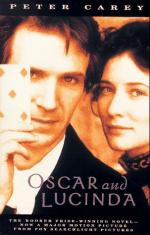|
This section contains 4,265 words (approx. 15 pages at 300 words per page) |

|
SOURCE: "Is the (Günter) Grass Greener on the Other Side? Oskar and Lucinde in the New World," in World Literature Written in English, Vol. 30, No. 1, Spring, 1990, pp. 1-10.
In the following essay, Huggan compares Carey's Oscar and Lucinda to Günter Grass's The Tin Drum, arguing that Carey's novel is an allegorical critique of colonialism.
By the final stages of Günter Grass's notorious novel The Tin Drum, first published in 1959, the rebellious dwarf Oskar and his counter-rhythmical drum have achieved cult status. "What we cured best of all," gloats Oskar, "was loss of memory. The word 'Oskarism' made its first appearance, but not, I am sorry to say, its last." No doubt Oskar would be perversely delighted to know that "Oskarism" is still alive and well, with disciples all over the post-colonial world. For Grass's novel has held a particular fascination for post-colonial writers, among them...
|
This section contains 4,265 words (approx. 15 pages at 300 words per page) |

|


